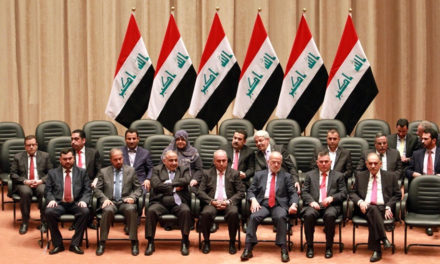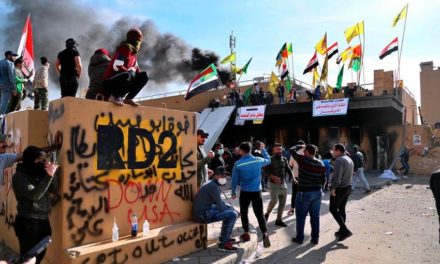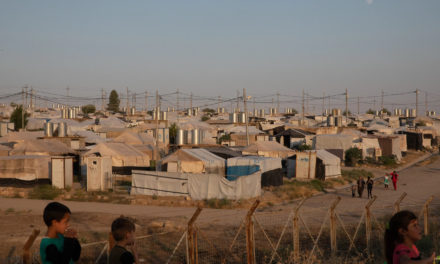The fallout continues more than a week after U.S. President Donald Trump’s sudden announcement that he was withdrawing American troops from Syria. Syrian Kurds and their Arab allies threatened to release thousands of Da’ish prisoners as the Turkish government began to escalate rhetoric about invading northeastern Syria. Da’ish, heartened by Trump’s announcement, launched a heavy counterattack in Hajin in eastern Syria, an area that had been recaptured by the Syrian Democratic Forces (SDF) just days earlier. Iraqi forces along the border with Syria were reinforced and put on high alert due to reports of potential imminent Da’ish infiltrations and reports indicate that plans were drawn up for a possible Iraqi ground incursion into Syrian territory. It’s safe to say, the announcement went down well.
Undoubtedly, Trump’s withdrawal from Syria will impact the country’s Kurdish community the most. SDF commanders announced that they could be left in a position where they would have to divert the majority of their forces away from anti-Da’ish operations in the event of a Turkish attack on their territories. Turkish President Recep Erdogan announced last week that his forces could start military operations against the Kurdish YPG (People’s Protection Units) east of the Euphrates River at any moment before backtracking on his comments and declaring that such operations will be delayed until after the results of the U.S. withdrawal become apparent. However, this decision and its aftermath will also have major consequences for the war on Da’ish and Syria’s neighbours, with Iraq the most likely to feel the effects of a collapse amongst the ranks of anti-Da’ish forces in eastern and northeastern Syria.
Since the defeat of Da’ish in Iraq late last year, the country has experienced an unprecedented decrease in armed violence and terror incidents. Iraq’s intelligence and security forces have since launched more than 100 major operations to hunt down and eliminate Da’ish remnants and terror cells hiding out in historic jihadist strongholds around the country. The western Anbari desert stretching all the way towards the border with Syria and the Jazirah region which extends into Ninawa province are two areas that still witness worrying levels of Da’ish activity and are under threat from probing attacks from inside Syria.
Iraqi intelligence and military sources have indicated in recent weeks that Da’ish units under the command of Iraqi and foreign militants have entered the Iraqi desert in order to re-establish terror networks largely decimated during the liberation operations that concluded last year. One such unit, led by a Da’ish terrorist from the Syrian town of Mayadin named Abu Ha’el Al-Suri, was reportedly obliterated by Coalition airstrikes on a tunnel system in the Hatra region of southern Ninawa province a couple of weeks ago, alongside a number of his fighters. More than a hundred fighters had also reportedly entered Iraq and sought refuge in Ba’aj after fleeing from heavy fighting with the SDF in Deir Ezzour.
The collapse of the SDF in eastern Syria, whether due to Da’ish exploiting cracks in their morale or due to a Turkish onslaught, could prove to be a disaster for the security of western Iraq. From 2014 until its liberation in November last year, the Iraqi town of Al-Qa’im served as a command centre second only to the main Da’ish bastions in Mosul and Raqqa. Al-Qa’im was the hypothalamus of the so-called “caliphate”, with Da’ish leadership issuing instructions and launching terror attacks in both Iraq and Syria from the town. Several major terror attacks in the Iraqi capital, Baghdad, were traced back by Iraqi intelligence to cells in Al-Qa’im. Just a few kilometres across the border in Syria, Da’ish is currently engaged in brutal battles with the SDF for control of the district of Albu Kamal. The Iraqi towns of Rawah, Anah, Rutbah and the city of Haditha would quickly feel the brunt of a resurgent Da’ish across the 600km-long border between Iraq and Syria, as well as Sinjar, Hatra, Ba’aj and other districts in the northwest of the country.
A drop in U.S.-led Coalition air support for the SDF in eastern Syria could have a monumental effect on their ability to maintain their relative success. Earlier this month, the Coalition announced that it had conducted 250 airstrikes in the Hajin area between the 2nd and 8th of December. Upwards of 35 airstrikes a day in such a concentrated area is indicative of just how entrenched Da’ish was in the small city and how reliant the SDF was on American support. Nevertheless, it emerged in Turkish media on Sunday that U.S. troops had cleared out of their base in the town of Al-Malikiyah in Hasakah, Syria. Around 50 American troops and their armoured vehicles were apparently transported to bases in Iraq.
While the details of his Syrian withdrawal remain vague, Trump confirmed during his recent visit to Iraq that he had no intention of pulling the 5,200 American troops in the country and that they could be used to combat Da’ish in Syria, an enemy he had just declared as vanquished. Recent reports indicate that Iraqi and Coalition troops are in the process of building two temporary bases in the western Anbari desert to deal with the looming Da’ish threat across the border. According to Anbar Provincial Council member Sabah Karhout, the first of these bases is north of the Al-Rummanah area near Al-Qa’im and the second base is east of the town of Rutbah. Satellite imagery of one of these locations showed Iraqi, American and French heavy artillery based there, which indicates that these bases could be used to support SDF operations or even Iraqi ground incursions into Syria.
Iraqi forces regularly bombard Da’ish targets inside Syria from artillery outposts along the border region and the Iraqi Air Force has conducted more than two dozen air raids inside Syrian territory during 2018, with most of the strikes targeting Da’ish command centres, car bomb factories or high-level meetings between senior Da’ish commanders. Iraqi Army artillery struck Da’ish positions near Hajin and Shafaah early on Saturday morning, reportedly killing a number of Da’ish militants.
However, the overbearingly arrogant nature of Trump’s visit to Iraq enraged Iraqi politicians who claimed the lack of a meeting between Trump and any Iraqi officials amounted to his trip being a disrespectful intrusion and violation of Iraqi sovereignty. In response, pro-Iran blocs within the Iraqi parliamentary demanded that legislation to force the expulsion of U.S. troops from Iraq should be discussed in the Council of Representatives as soon as possible.
The Syrian Kurdish leadership seems to have come to the inevitable conclusion that stuck between an American betrayal and a pack of Turkish wolves thirsty for their blood, the only option available is to turn to the Syrian government. Negotiations between the two sides are apparently under way with the Syrians moving their troops to the outskirts of YPG-controlled Manbij, a key target of the Turkish leadership. Russian and Turkish officials have also held meetings to discuss the next steps in northern Syria. The Iraqi government must also raise these issues with their Turkish counterparts, as a significant escalation in violence in northeastern Syria will not only inevitably spill into Iraq’s territory but will also likely create a major humanitarian crisis, with thousands of displaced civilians trying to reach safety in northwestern Iraq or the Kurdistan Region of Iraq. The Turks already have their eyes set firmly on the PKK (Kurdistan Workers’ Party) and their Yezidi allies in Sinjar and have largely ignored protests from Baghdad over Turkish airstrikes in the area.
Within hours of Trump’s withdrawal announcement last week, Iraqi reinforcements reached several installations along the border with Syria. Border Guard and Hashd Al-Sha’abi (PMUs) units have fitted many of their fortifications with thermographic cameras for monitoring nearby Da’ish activity. While such steps are encouraging, it should not stop there. Stepping up reconnaissance flights inside Syria, special forces raids behind Da’ish lines, heavy bombardment of Da’ish positions and other offensive options should accompany urgent upgrades of Iraqi border posts and nearby army barracks. Da’ish attempts to establish footholds in western Iraq has to be met with an iron-fist response.
Prime Minister Adil Abdul-Mahdi announced that he was “considering all the options” when it came to deploying Iraqi troops inside Syria and expressed his concerns over the possibility of Da’ish expanding their footprint in the region due to the latest developments. Abdul-Mahdi also sent a letter to Syrian President BasharAl-Assad via Iraq’s National Security Advisor Falih Al-Fayyadh who visited Damascus on December 29. Cooperation in the war on Da’ish, especially in and around the border region, was one of the main topics discussed. On Sunday, Syrian media announced that President Bashar Al-Assad had authorized Iraqi forces to strike Da’ish targets inside Syria without needing to seek permission from Syrian authorities. The Syrians have probably rarely objected to Iraqi requests for permission to strike Da’ish on their territory and this move is seen as a symbolic gesture to highlight the partnership in the war on Da’ish.
In any case, a close eye must be maintained on the situation in eastern Syria and western Iraq by all parties involved in the war on Da’ish to avoid major setbacks that could put the lives of tens of thousands of civilians on the line. Intelligence reports from western Anbar put the number of Da’ish militants hiding in desert camps, tunnel systems or among Anbari communities at about two to three thousand. Across the border, thousands more are either locked in battles with the SDF or awaiting orders regarding the next chapter of their “jihad” and the side of the border it will unfold on. The situation might be relatively stable today but that could change in a heartbeat. Whatever comes next, the maintenance of SDF lines against Da’ish across eastern Syria must be considered as a high priority in order to deny the terrorist group its first major territorial gains since the collapse of their “caliphate”. In the event of the SDF no longer being able to do the job, the Iraqi and Syrian militaries must be prepared to fill the gaps they leave behind.

Haidar Sumeri
Haidar Sumeri is a Middle East observer, mainly focusing on Iraq’s war on terrorism.










